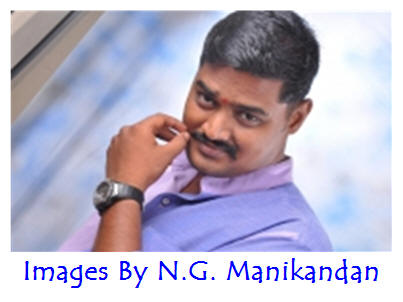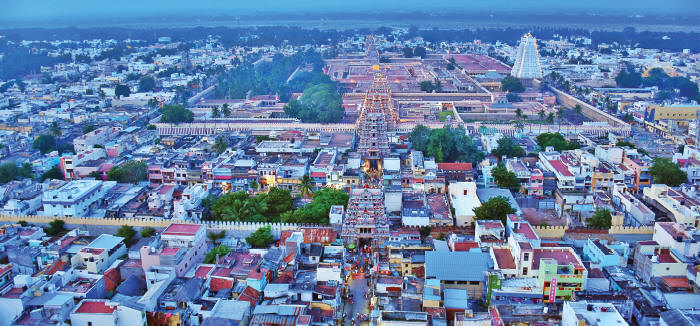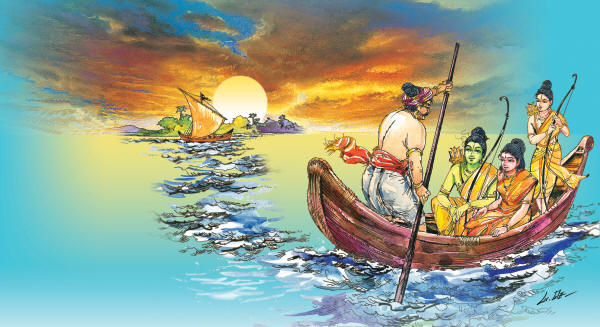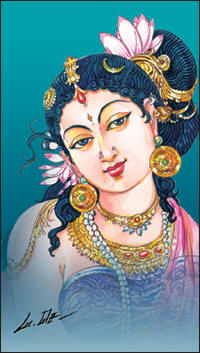Sakthi Vikatan - 12 Feb, 2019
Posted Date : 06:00 (29/01/2019)
Author: Indira Soundarrajan &
Images: N.G. Manikandan


Among those who nurtured, Chera king Thidavirathaṉ was one. Not having progeny as the cause of his distress made him perform his service to the temple with greater personal involvement. 2
Where there is no cause or impetus, there is no action! 3
For Thidavirathaṉ, there was a reason to be blessed with a child. Expunging of his past Karma had its remedy in the king’s fostering, preservation and protection of the temple. 4
Though Thidavirathaṉ ruled his country, based at Thirvañchaikkaḷam, the Pāṇdiya-Chōza kingdoms were under his control. Therefore, he supported, nurtured and maintained all the temples under his purview. He encouraged daily sacerdotal services in their fullness. These auspicious services helped him to beget a child as a blessing in the name of Kulasēkaraṉ, who was one among the 12 Āzvārs. Kulasēkaraṉ in the tradition of the Brahmanas learned Vedas and its six limbs (parts, like kingly justice, Dharma Sastra…). He was no less in the art and science of war. 6
Kollikkāvalaṉ, Kadal Nāyakaṉ, and Kōzik kāvalaṉ are some of the titles earned by Kulasēkaraṉ. He begot a boy and a girl. The son was a reflection of the bravery of his paternal grandfather and his daughter named Iḷai, the epitome of Bakthi. Though Kulasēkaraṉ in the tradition of his dynasty had control over Thenpulam (South Country) and shined as the emperor, now and then a nagging question arose in his mind. 7
‘All of this world is subject to change. No one entity can be called permanent. Likewise, there are continuous changes in the body resulting in unavoidable old age. 8
Why is it so? Can’t there be life without death? No, why mustn’t there be life without death? Questions aplenty of this nature rose in his mind. 9
For accurate and precise answers for these questions, one should join Sathsaṅg (Association of the good) and become knowledgeable of Puranas, according to religious instructions. Kulasēkaraṉ paid attention to instructions from and talks by the spiritually perfected individuals. Here only, his life took a new direction. 10
Kulasēkaraṉ paid great attention to Talks in the Association of the good on Avatara Puranas. When he heard Ramayana Upanyāsas (talks, lectures, discourses), his heart melted with the accompaniment of tears. He never regarded as past events of yesteryears. He considered all those events as happening at present. 11

Here is an instance. When Sugrīvaṉ showed Sita’s clothes to Rama, Rama shed tears. Rama: These are the clothes of Sita. How could Sita remain without these clothes, which were cast off the forest? When will I see her? When the Upanyāsar (discourser) referred to Rama shedding tears, Kulasekaran’s eyes were welling with tears and ran like a stream. 12
Seeing Kulasekaran’s teary interlude, the discourser was ecstatic to learn of Kulasekaran’s mind and soul. The royal members live in luxury and never shed tears on any account. But Kulasekaraṉ was an exception. 13
Indrajit, the son of Ravana, showed off his familiar magical feats in the battleground when Rama and Ravana were battling. Indrajit materialized an apparition of Sita on the battlefield, cut her head off and trumpeted loud that he killed Sita. It is not known whether Rama fainted or not. But king Kulasēkaraṉ in the audience fainted hearing this episode. The spiritual discourser did not expect it. He was surprised to notice the anxiety, distress and great absorption into the story by Kulasēkaraṉ. 14
Once, the king addressed the discourser, “Dear sir, that is enough. Stop your discourse forthwith. There Emperuman is alone by himself doing the fighting. Should we not help him at this juncture. 15
The king: “I will bring my military machine now. I will make sure that the enemies take to their heels tomorrow. If Ramachandra Prabhu himself is subjected to these trials, we are nothing.” As the king spoke with such fervor as if he was in the middle of the battle, the discourser melted in his heart. He comforted and reminded king Kulasēkaraṉ all these events happened in the past with a successful conclusion. 16
Kulasēkaraṉ did not believe the words he heard and said, “You are comforting and telling me a lie. We have to help Rāmapirāṉ. Hanuman can help him. Sugrīvaṉ too. Why should not I help him? Why is my military there without any purpose?” 16
Kulasēkaraṉ shone as a supreme devotee to Emperuman. All over his country, the supreme devotees walked around wearing the sacred symbol of Vaishnavism (Nāmam) on the twelve body parts. Kulasēkaraṉ felt serving them meals as his fortune. 18
As a result, there was an overflow of servitors in the palace grounds. The council of ministers was unhappy seeing this. The palace became a Bajanai Madam (a public place for group chanting), according to the ministers. The reigning of the kingdom and the path of devotion are two different entities. The ministers came to the conclusion that the king Kulasēkaraṉ was neither proficient in the reigning of the kingdom nor pursuing the path of devotion. They concluded that with an excess devotion to Emperuman, he conducted himself with utter confusion. 19
The council of ministers held a conference, devised a plan and concluded, “This cannot stand. We have to put a stop to this. No servitor should be allowed into the palace.” Then it was Ramanavami. Kulasēkaraṉ wanted to hold the festival inside the palace. There was an extraordinary crowd of servitors and made the palace more as a temple. 20
This was the ripe time for the ministers to put their plan to work. They complained that a gem-laden garland in the array of jewels was missing from the holy body of SrīRamar. 21
The king: “My gem-laden garland missing?” 22
The ministers: “Wrong, our king! It is not missing. It was stolen.” 23
The king: “Robbery. In my palace.” 24
Ministers: “Yes our king! In the past, there was a restraint in the palace to keep out unauthorized people. You removed the restriction on behalf of the servitors of Emperuman. 25
The king: “Do you allege that the servitors committed a crime?” 26
Ministers: “Why can’t one of them be a thief?” 27
The king: “Impossible. Utterly impossible! From Māl down to the servitors of Māl (Vishnu), gold and diamonds are equal to dust. There is nothing greater than the shadow of the feet of Mālavaṉ (Vishnu) in this world. 28
Ministers: “That is your opinion. But the thieves could have come in the guise of servitors, is it not true? 29
The king: “That is your imagination.” 30
Minsters: “That is our conclusion.” 31
The king: “Alright. Tell me what should be done.” 32
Ministers: “We will issue an order. No matter who stole the gem garland, he should come forward and surrender the garland. If he asserts innocence, he should prove it by putting his hand inside a pot of cobras.”33

The king: “What! A basket of cobras? 34
Ministers: Yes. This is one way of unmasking the thief. The snake will not touch a true servitor. It will bite a false one.”35
The minister said in an arrogant demeanor. Kulasekaran’s mind was perturbed to hear it. It appeared to him that it was a great sin to make the servitor look diminished. The king came to a conclusion. It was a conclusion that the ministers could not have imagined. 36
Kulasēkaraṉ kept his plan close to his heart. When the ministers came with a pot of cobras, he was prepared to put his plan to work. By that time, the servitors of Māl left the palace. 37
The servitors understood it was wise to keep a distance from the king and the raging river. In both cases, dipping the foot not knowing the depth, drowning was certain. The king understood this paradigm. The king thinking of it stopped the snake-pot carrier abruptly and prepared himself to put the hand into the pot of snakes. 38
On the minister: “Ayyō! My king.” The preparatory act shocked everyone in the assembly. 39
The king: “My ministers! On behalf of all Servitors of Māl, I will dip my hand into the pot. If a Māladiyār (Servitor of Māl or Vishnu) was a thief, the snake will bite me and prove the guilt of the servitor. If it does not bite, that proves the servitor’s innocence. I am not prepared to subject a servitor to this kind of test anytime. Saying such words, Kulasēkaraṉ dipped his hand into the pot. 40
The snake did not bite him. The council of ministers felt they were subjected to the bite of the snake. They stood there, not knowing what to do. 41
The proof came forth that the Māladiyār did not commit any crime. The chief minister fell at the feet of the king and begged for forgiveness. In truth, the jewel was not missing. It was portrayed as missing. 42
The chief minister: “My king! We staged the illusion of robbery to bring down the foot traffic of the servitors inside the palace.
“You are a king. You take your reigning task seriously. What will happen to the country, if you give up your vocation and take the path of devotion to God. 44
The king: “If it is so, is the path of God denied to the ruling king. The chief minister posed a counter question. 45
Chief minister: “We are not saying or implying such a statement. 46
The king: “What do you mean?”47
The chief minister: “Your demonstrated bravery made you the emperor of Chēra, Chōzha, and Pāṇḍya kingdoms. The enemies are at the ready to destroy us. As long as the enemies consider you as a great hero, the country will have a resemblance as a nation. If they consider you as an unattached sage and servitor, our enemies will plunder our country. We cannot face that danger. 48
The advice of the ministers as to the danger of plunder put the king in a chokehold. He cogitated for a long time. Finally, he came to a conclusion. He called his son Thidavirathaṉ and said, “My son! You are the king henceforth. I relinquished myself to the service of Māl. I cannot bear arms to battle or kill life. Though an emperor, the path leads to God. Failure will result in rebirth and roiling in the ocean of metempsychosis. My kingship has been long enough for me. I decided I will spend the rest of my life as Mālaḍiyaṉ (the servitor of Māl) and merge with him eventually. 49
The king: “You rule this country according to the desires of the council of ministers. I have one request. Do not on any account disrespect or cause injury to the servitors.” The king abdicated, giving up his crown. He wore tree barks as his clothes. 50
Iḷai, the daughter of Kulasēkaraṉ: “Father! Can you abandon me and go on the path of devotion to God? What sin did I commit?” 51
The king: “Child! Are you undesirous of being a princess? 52
The princess: “I always followed your likes and wishes. How could you ask me a question like it?” 53
The king: “You are of the age to live and take responsibility.”54
Princess: “Yes. I am of the age to have and live with Maṇavāḷaṉ.”55
The king: Child, what is this? Is Araṅgaṉ your Maṇāḷaṉ? 56
Princess: Yes, father! I dedicated myself to him.” 57
The king: “These are the words of Kamalavaḷḷi, the daughter of Nanda Chōzaṉ.” 58
Princess: “her chosen path is my path.”59 60
The king: “I have no objection. We live with impurities like the spit and feces. We sleep, become old and wait for Yemen (Deity of death) wondering every day
Princess: “You said it right. Won’t the God, who showed mercy to Kamalavalli, show me compassion? 61
The king: “Let us believe in it. Let us start the journey. Hereafter, Tiruvaraṅgam is our place to live. Tiruvaraṅgam is the joy of our life.” 62
King Kulasēkaraṉ with his daughter Iḷai began his journey. 63
Will continue.
Indira Soundarrajan. Image: N.G. Manikandan.